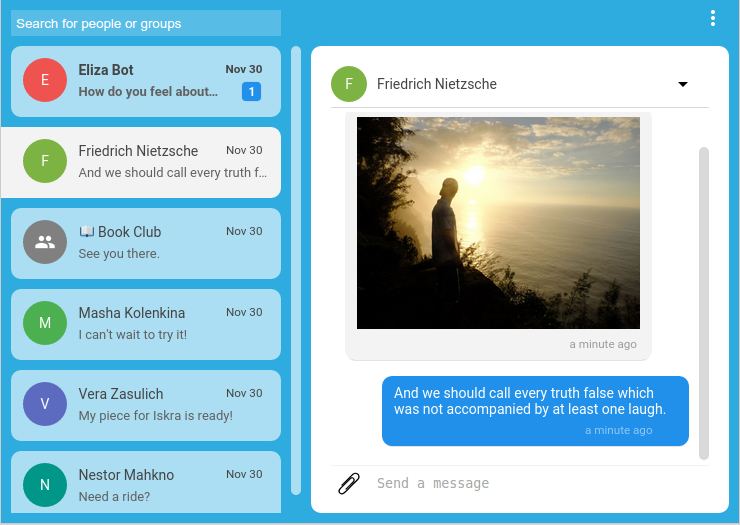Signal Desktop is an app that lets you send or receive Signal messages using your laptop or desktop computer. It runs independently of a web browser.
Signal uses standard cellular mobile numbers as identifiers, and uses end-to-end encryption to secure all communications to other Signal users. The applications include mechanisms by which users can independently verify the identity of their messaging correspondents and the integrity of the data channel.
Signal Desktop must link with either Signal Android or Signal iOS to be available for messaging.
Signal Desktop is Electron-based. Electron allows for the development of desktop GUI applications using front and back end components originally developed for web applications: Node.js runtime for the backend and Chromium for the frontend.
Features include:
- Simple and easy-to-use application.
- Read and send messages.
- Send/set timer for disappearing messages.
- Change theme (includes dark theme).
- Import groups & contacts.
- Check/verify encryption keys.
- Reset a session.
- Messaging is private – uses end-to-end encryption. In-app codes offers the ability to verify the connection.
- Syncs with Signal on your mobile phone
- Receive contact:
- Show contact in message bubble, in all themes.
- Message detail view.
- “Send message” button which opens conversation with that user.
- Include contact name (or organization, if no name) in reply to a message with a contact and no body text.
- Media gallery.
- Multi-message notifications.
- Support for receiving quoted replies.
- Themes.
- Cross-platform support – Linux, MacOS, and Windows operating systems are supported. Linux distributions supporting APT, like Ubuntu or Debian.
- Flatpak version is available.
- Internationalization support.
Website: signal.org
Support: Blog, GitHub Code Repository
Developer: Open Whisper Systems and contributors
License: GNU General Public License v3.0

Signal is written in JavaScript. Learn JavaScript with our recommended free books and free tutorials.
| Popular series | |
|---|---|
| The largest compilation of the best free and open source software in the universe. Each article is supplied with a legendary ratings chart helping you to make informed decisions. | |
| Hundreds of in-depth reviews offering our unbiased and expert opinion on software. We offer helpful and impartial information. | |
| The Big List of Active Linux Distros is a large compilation of actively developed Linux distributions. | |
| Replace proprietary software with open source alternatives: Google, Microsoft, Apple, Adobe, IBM, Autodesk, Oracle, Atlassian, Corel, Cisco, Intuit, SAS, Progress, Salesforce, and Citrix | |
| Awesome Free Linux Games Tools showcases a series of tools that making gaming on Linux a more pleasurable experience. This is a new series. | |
| Machine Learning explores practical applications of machine learning and deep learning from a Linux perspective. We've written reviews of more than 40 self-hosted apps. All are free and open source. | |
| New to Linux? Read our Linux for Starters series. We start right at the basics and teach you everything you need to know to get started with Linux. | |
| Alternatives to popular CLI tools showcases essential tools that are modern replacements for core Linux utilities. | |
| Essential Linux system tools focuses on small, indispensable utilities, useful for system administrators as well as regular users. | |
| Linux utilities to maximise your productivity. Small, indispensable tools, useful for anyone running a Linux machine. | |
| Surveys popular streaming services from a Linux perspective: Amazon Music Unlimited, Myuzi, Spotify, Deezer, Tidal. | |
| Saving Money with Linux looks at how you can reduce your energy bills running Linux. | |
| Home computers became commonplace in the 1980s. Emulate home computers including the Commodore 64, Amiga, Atari ST, ZX81, Amstrad CPC, and ZX Spectrum. | |
| Now and Then examines how promising open source software fared over the years. It can be a bumpy ride. | |
| Linux at Home looks at a range of home activities where Linux can play its part, making the most of our time at home, keeping active and engaged. | |
| Linux Candy reveals the lighter side of Linux. Have some fun and escape from the daily drudgery. | |
| Getting Started with Docker helps you master Docker, a set of platform as a service products that delivers software in packages called containers. | |
| Best Free Android Apps. We showcase free Android apps that are definitely worth downloading. There's a strict eligibility criteria for inclusion in this series. | |
| These best free books accelerate your learning of every programming language. Learn a new language today! | |
| These free tutorials offer the perfect tonic to our free programming books series. | |
| Linux Around The World showcases usergroups that are relevant to Linux enthusiasts. Great ways to meet up with fellow enthusiasts. | |
| Stars and Stripes is an occasional series looking at the impact of Linux in the USA. | |